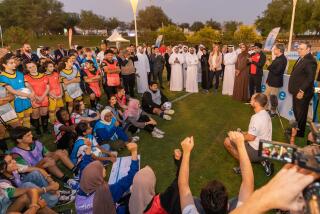TV GOES GLOBAL ON WORLDNET
- Share via
WASHINGTON — It was morning in East Asia as doctors and medical journalists gathered at U.S. embassies in six cities to see and talk with America’s two leading doctors in the field of artificial heart implants.
It was 8 p.m. in Louisville, Ky., where Dr. William DeVries, who recently performed his third artificial heart implant in a human, was standing by. And it was 6 p.m. for Dr. Robert Jarvik, the inventor of the artificial heart, who was in Salt Lake City.
Through the marvel of satellite technology, DeVries and Jarvik were being linked with doctors and medical journalists in Bangkok, Hong Kong, Jakarta, Manila, Singapore and Sydney in a high-tech TV global news conference this week that was moderated through Washington.
In mid-January, the two doctors did a similar program that went to Europe. Both satellite broadcasts were produced not by a commercial TV network but by the U.S. Information Agency through Worldnet, the government’s own TV network with satellite links to about 40 U.S. embassies around the world.
USIA officials say that Worldnet provides dramatic opportunities for unfiltered statements about America’s positions to be tested thousands of miles away in unrehearsed sessions with foreign correspondents and government leaders of other nations.
“This has been a real breakthrough because it’s the nearest thing to being there in person,” USIA Director Charles Z. Wick said.
USIA has conducted about 70 Worldnet news sessions since the program was launched under Wick’s direction a little more than a year ago. In the last half of 1984, Wick said in an interview, 30 programs were seen by 1 billion people.
To date, most broadcasts have been news conferences, with foreign journalists questioning U.S. officials live from USIA’s spacious TV studio in Washington. In these interactive broadcasts, participants at the foreign locations can see and speak to officials in Washington or other designated locations.
Beginning in April, USIA will launch a major expansion of Worldnet, with two hours of news and feature programs broadcast to Europe five days a week. However, the programs won’t be going just to the foreign posts. For the first time, they will also be seen in hotels in Europe as well as by millions of viewers on European cable systems. (USIA programs are not shown in the United States.)
“We think this is going to be a spectacular service,” said Alvin Snyder, director of television for USIA. “It’s the only one of its kind.”
The programs will include news broadcasts from the previous evening, documentary films and other feature programs produced by USIA as well as films acquired outside the agency. Worldnet producers plan to include a wide range of programming, from science shows to cultural series. They also hope to show excerpts of Capitol Hill proceedings from C-SPAN, the cable public affairs TV network.
“This is truly the world’s first global television service,” Snyder said, adding that his agency is holding discussions about utilizing other regional satellite systems in the Caribbean, Latin America and the Middle East for the daily broadcasts.
Worldnet will still include news conferences once a week or every 10 days, but the sessions will be broadened to include more shows like the recent programs that featured DeVries and Jarvik. For example, Snyder says Worldnet plans to present a show for the Middle East next Saturday that will deal with hypertension, a serious health problem in that part of the world. Doctors in five Arab countries will have an opportunity to question leading cardiologists live from Los Angeles.
Wick said future programs also will examine a variety of other subjects, including cultural areas. “We’ll be doing something on the history of the motion picture and the history of dance,” he said.
The USIA director also expects stations to be eventually installed at all 60 U.S. foreign posts to receive the Worldnet programming.
The idea for Worldnet originated with Wick, who was in Paris in the fall of 1983 when the United States invaded Grenada. Unhappy with the reaction of British Prime Minister Margaret Thatcher and other Western European leaders, Wick suggested an international news conference when he returned. On Nov. 3, outgoing U.N. Ambassador Jeane J. Kirkpatrick and two East Caribbean prime ministers in Barbados talked with more than 40 journalists in eight European countries.
The result, he said, was dramatic, including 11 minutes on the evening news on independent television in Britain. “We could never have bought that time,” he added. “We felt we had really stumbled on something that was much greater in consequence than we have ever dreamed of.”
Since its beginning, Worldnet has included appearances by cabinet and top government officials and other news makers. Last June, Peter Ueberroth, then president of the Los Angeles Olympic Organizing Committee, and Los Angeles Mayor Tom Bradley talked with African nations about the Olympic Games.
Worldnet received about $13.9 million in funding for fiscal 1985, of which $11 million went for satellite transmissions. The Reagan Administration’s budget proposal for fiscal 1986, which begins in October, includes $15 million for Worldnet, of which about $10.7 million will be for transmission costs.
Wick believes that Worldnet’s success may lead to a new era in public diplomacy. “There isn’t a foreign leader who doesn’t know of it,” he said.
On Jan. 25, he wrote to Leonid M. Zamyatin, chief of the international information department of the Soviet Union’s Communist Party Central Committee to propose that Soviet journalists participate in a one- or two-hour Worldnet session questioning senior U.S officials in return for a program allowing American journalists to question senior Soviet officials.
If that should happen, Wick believes it won’t be long before world leaders use these satellite sessions for more public, as well as private meetings.
“We think that is definitely coming very soon,” he said.
More to Read
Sign up for Essential California
The most important California stories and recommendations in your inbox every morning.
You may occasionally receive promotional content from the Los Angeles Times.













